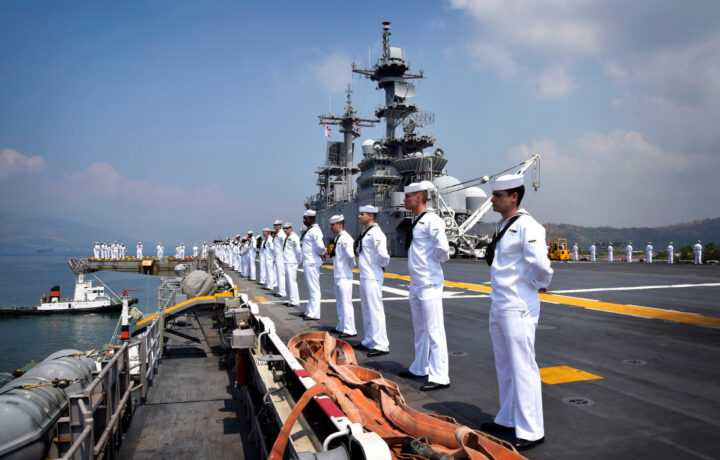Until it closed in 1992, the United States Navy’s Naval Base Subic Bay, northwest of Manila Bay, was the largest overseas military installation of the United States Armed Forces. It has since been transformed into the Subic Bay Freeport Zone by the Philippine government, and while the U.S. isn’t likely to have anywhere near the same level of presence, the U.S. Navy is still seeking to establish a new storage facility near the former base.
According to a report from USNI News, the Department of the Navy has sought to lease a climate-controlled facility that would be between 19,000 and 33,000 square meters. It would be used for the storage of equipment beginning next year under a proposed 10-year-lease.
It would be the largest “prepositioning effort” between Washington and Manila since 1992, and would be significantly larger than the previously leased 5,300 square meter warehouse at the Naval Support Depot in Subic Bay. That facility will support United States Marine Corps staging efforts in the region.
“Space offered must be located within the Subic Bay Metropolitan Authority (SBMA) Freeport area or the Clark Economic Freeport Zone (SBMA-Clark Corridor) and be located within 96.56 kilometers (60 miles) of the NSD Compound Entrance Gate located at Argonaut Hwy, Subic Bay Freeport Zone, Olongapo, Zambales, Philippines as described in Attachment B, Area of Consideration,” the solicitation notice explained. “The Navy prefers for offered space to be ready for beneficial occupancy no later than May 15th, 2026.”
However, the solicitation did not include specific designations, while the lease would be for 10-years but without a renewal option. The facility will also need to be able to accommodate around 100 personnel.
Closer Ties Between Washington and Manila
The United States military regularly carries out joint exercises with the Philippines, and during those training drills, U.S. personnel have access to nine military bases through the Enhanced Defense Cooperation Agreement (EDCA). The bases are located in Palawan, Pampanga, Cebu, Nueva Ecija, and Cagayan de Oro.
Yet, U.S. troops have largely lacked any permanent equipment storage and maintenance facilities. A lease could allow the U.S. military to store and maintain equipment in the Philippines and even have another forward staging facility should the need arise.
Renewed Focus on Subic Bay
Now a Freeport Zone managed by the Filipino government, the facility was first established as a naval base by Spain in 1885, during its colonial rule of the Philippines. It was captured by the U.S. during the Spanish-American War, and before the Second World War was greatly expanded by the U.S. military as U.S. Naval Base Subic Bay. Occupied by the Imperial Japanese Navy during the war, it was liberated in 1945 and further expanded during the Cold War.
After Clark Air Base in Angeles City in the Philippines was closed in 1991, Naval Base Subic Bay was briefly the largest U.S. overseas military installation until it was also closed in 1992, following the 1991 Mount Pinatubo volcanic eruption. It was subsequently transformed into the Subic Bay Freeport Zone.
The U.S. Military Sealift Command has used the base to conduct repairs, while it serves as the Philippine Navy’s largest base.
Following the 2022 EDCA between Washington and Manila, plans were drafted to reopen a portion of the base due to heightened tensions with China. In addition, U.S. ships have continued to employ the facilities as a resupply port. It was announced earlier this year that a new United States Marine Corps prepositioning program began as the service leased a 5,300-square-meter warehouse, which will be used for humanitarian assistance and disaster response efforts as needed under the new Marine Corps Prepositioning Program-Philippines.
Subic Bay in China’s Crosshairs
It may not only be the U.S. Navy that is interested in the facility. Earlier this month, five Chinese nationals and a Cambodian citizen were arrested and charged with espionage in the Philippines after the individuals allegedly collected intelligence on U.S. Navy warships as well as critical infrastructure at Subic Bay Freeport Zone.
It was the latest in what has been reported to be a string of incidents involving suspected Chinese espionage.
The arrest of the seven individuals follows another in January in the Philippines of a Chinese national and two Filipino associates, who are accused of gathering intelligence on another military installation.


